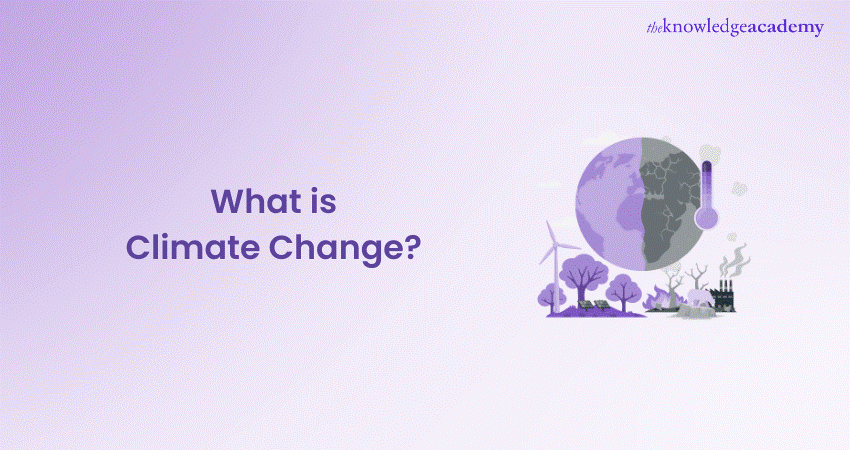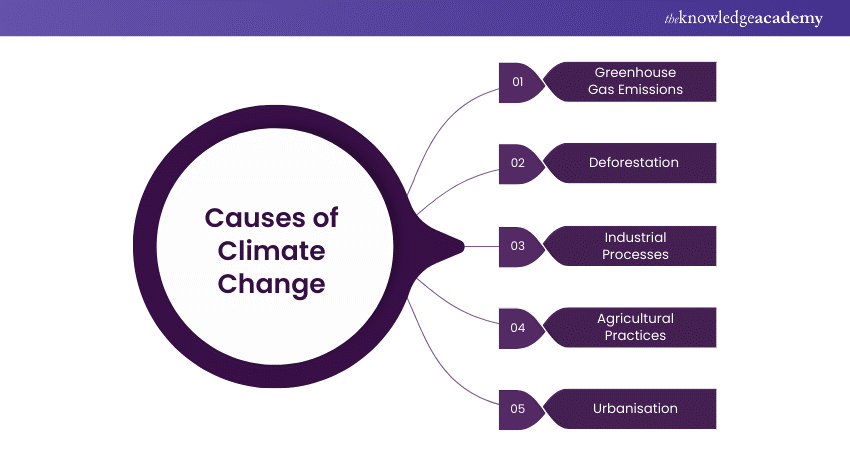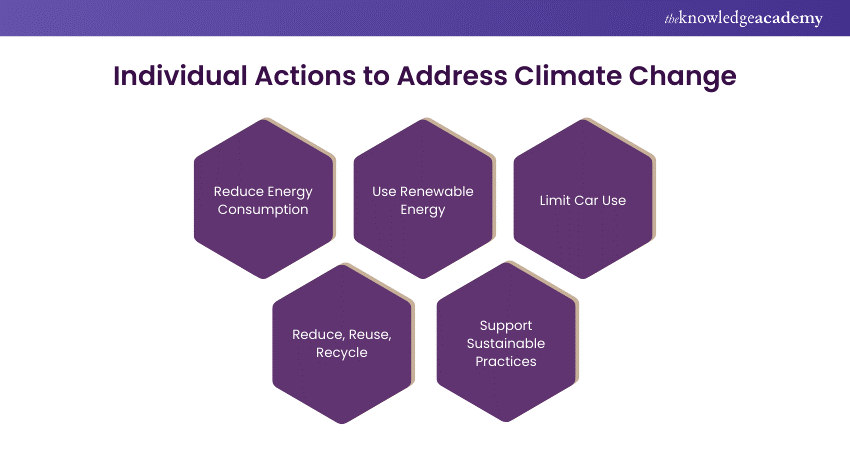We may not have the course you’re looking for. If you enquire or give us a call on +64 98874342 and speak to our training experts, we may still be able to help with your training requirements.
Training Outcomes Within Your Budget!
We ensure quality, budget-alignment, and timely delivery by our expert instructors.

Have you noticed the unusual weather patterns lately? Wondering what is causing these drastic changes? Climate Change is a pressing global issue that affects us all. But What is Climate Change, and why should you care?
Understanding What is Climate Change is crucial for everyone. It refers to long-term changes in the Earth’s climate, like temperature, rain, and wind patterns, mainly caused by human activities. These changes lead to higher global temperatures, rising sea levels, and more extreme weather events.
Learn more about What is Climate Change and how you can help mitigate its impact in this blog. Your knowledge and actions can make a difference in creating a sustainable future.
Table of Contents
1) What is Climate Change?
2) Causes of Climate Change
3) Impacts of Climate Change
a) Human Impact on Climate Change
b) Current Effects of Climate Change
c) Health Impacts of Climate Change
4) Individual Actions to Address Climate Change
5) Conclusion
What is Climate Change?
Climate Change refers to various changes in weather patterns that occur over several decades or longer. It includes both global warming, driven by human-induced increases in Greenhouse Gases, and the resulting large-scale shifts in weather patterns. While the Earth's climate has naturally fluctuated over geological time scales, the current rate of change is unprecedented due to anthropogenic influences.
Key points about Climate Change:
1) Global Warming: The Earth's average surface temperature has increased due to the higher concentration of Greenhouse Gases, primarily Carbon Dioxide (CO2), Methane (CH4), and Nitrous Oxide (N2O).
2) Weather Extremes: Climate Change leads to more frequent and severe weather events, such as hurricanes, heatwaves, and heavy rainfall.
3) Ecosystem Disruption: Altered temperature and precipitation patterns affect ecosystems and biodiversity, leading to shifts in species distributions and the timing of biological events.
Causes of Climate Change
The primary causes of Climate Change are linked to human activities that alter the composition of the Earth's atmosphere and land surfaces. The key factors include:

1) Greenhouse Gas Emissions: Burning fossil fuels (coal, oil, natural gas) for energy and transportation releases significant amounts of CO2 and other Greenhouse Gases (GHS) into the atmosphere. These gases trap heat, leading to the greenhouse effect and global warming.
2) Deforestation: Trees absorb CO2, acting as carbon sinks. Deforestation for agriculture, logging, and urban development reduces the number of trees, decreasing the Earth's capacity to absorb CO2 and increasing atmospheric carbon levels.
3) Industrial Processes: Factories and industrial activities release various Greenhouse Gases and aerosols. The production of cement, steel, and chemicals contributes to these emissions.
4) Agricultural Practices: Modern farming techniques, including the use of synthetic fertilisers and pesticides, release nitrous oxide. Livestock farming produces methane through enteric fermentation and manure management.
5) Urbanisation: The expansion of urban areas leads to higher energy consumption and increased emissions from transportation, heating, and cooling. Cities also produce substantial amounts of waste, contributing to methane emissions from landfills.
Understanding these causes is essential for developing strategies to mitigate Climate Change and reduce its impacts on the planet. By addressing the root causes, we can work towards a more sustainable and resilient future.
Start your ISO 14001 Foundation Certification Training today and enhance your Environmental Management skills!
Impacts of Climate Change
Climate Change impacts all areas of the Earth, affecting natural systems, human health, and socio-economic structures. The effects vary, including increased sea levels, severe weather events, and disturbances in ecosystems and agriculture.
Understanding these effects is important for creating plans to lessen Climate Change and adjust to its unavoidable consequences. Now, let’s explore how Climate Change is transforming our world and its various impacts.
Human Impact on Climate Change
Human activities have greatly impacted the Earth's climate, accelerating changes that were once gradual and natural. Our actions have increased the concentration of Greenhouse Gases in the atmosphere, leading to significant and often detrimental changes in climate patterns.
1) Greenhouse Gas Emissions: The main causes of climate change are the burning of fossil fuels, deforestation, and industrial processes.
2) Deforestation: Reduces the Earth's capacity to absorb CO2, exacerbating the greenhouse effect.
3) Industrialisation: Emits large amounts of CO2 and other GHGs.
4) Agriculture: Produces methane and nitrous oxide, potent Greenhouse Gases.
5) Urbanisation: Increases energy consumption and GHG emissions.
Current Effects of Climate Change
Climate Change is already having visible effects on the planet:
1) Rising Ocean Levels: Melting glaciers and ice sheets add more water to the oceans, causing sea levels to rise.
2) Ocean Acidification: When the ocean absorbs CO2, it becomes more acidic, harming marine life and ecosystems.
3) Extreme Weather Events: More frequent and severe weather events, such as hurricanes, heatwaves, and heavy rainfall.
4) Ecosystem Disruption: Changes in temperature and precipitation patterns affect ecosystems and biodiversity.
Health Impacts of Climate Change
Climate Change has significant health implications for people around the world:
1) Heat-Related Illnesses: Increased temperatures lead to more heatwaves, causing heat-related illnesses and deaths.
2) Respiratory Issues: Poor air quality from pollution and wildfires exacerbates respiratory problems.
3) Vector-Borne Diseases: Changes in climate can expand the range of diseases carried by insects, such as malaria and dengue fever.
4) Food and Water Security: Extreme weather events and changing climate patterns affect food and water availability, leading to malnutrition and water-borne diseases.
By identifying and understanding the impacts of Climate Change, we can better prepare and execute strategies to protect both our environment and health.
Transform with ISO 14097 - start your ISO 14097 Greenhouse Gas Management Training - sign up now!
Individual Actions to Address Climate Change
While large-scale action is necessary to combat Climate Change, individuals can also make a significant difference:

1) Reduce Energy Consumption: Use energy-efficient appliances, insulate your home, and turn off lights and electronics when not in use.
2) Use Renewable Energy: Switch to renewable energy sources, such as solar or wind power, for your home.
3) Limit Car Use: Walk, bike, use public transportation, or drive fuel-efficient vehicles.
4) Reduce, Reuse, Recycle: Minimise waste by recycling and reusing materials, and reducing single-use plastics.
5) Support Sustainable Practices: Buy locally produced food, support companies with sustainable practices, and reduce meat consumption.
Conclusion
Understanding What is Climate Change and its causes, impacts, and the actions we can take is important for addressing this global challenge. By making informed decisions and taking action, we can mitigate the effects of Climate Change and work towards a more sustainable and resilient future. Each individual's effort counts in this collective endeavour to protect our planet for future generations.
Master Environmental Management with expert ISO 14097 Training – join now!
Frequently Asked Questions

Climate Change is primarily driven by human activities, such as burning fossil fuels, deforestation, and industrial processes. These actions increase Greenhouse Gas emissions, leading to global warming. While natural factors contribute, the significant acceleration in Climate Change is largely due to human influence.

Yes, Climate Change is a real and significant threat. It leads to rising sea levels, extreme weather events, and disruptions to ecosystems and agriculture. These changes pose risks to human health, food and water security, and overall societal stability, making it imperative to address Climate Change urgently.

The Knowledge Academy takes global learning to new heights, offering over 30,000 online courses across 490+ locations in 220 countries. This expansive reach ensures accessibility and convenience for learners worldwide.
Alongside our diverse Online Course Catalogue, encompassing 17 major categories, we go the extra mile by providing a plethora of free educational Online Resources like News updates, Blogs, videos, webinars, and interview questions. Tailoring learning experiences further, professionals can maximise value with customisable Course Bundles of TKA.

The Knowledge Academy’s Knowledge Pass, a prepaid voucher, adds another layer of flexibility, allowing course bookings over a 12-month period. Join us on a journey where education knows no bounds.

The Knowledge Academy offers various ISO 14097 Training, including ISO 14097 Greenhouse Gas Management Training. This course caters to different skill levels, providing comprehensive insights into Environmental Aspects and Impacts Register.
Our Health & Safety Blogs cover a range of topics related to Greenhouse Effect, offering valuable resources, best practices, and industry insights. Whether you are a beginner or looking to advance your knowledge of Green House Management, The Knowledge Academy's diverse courses and informative blogs have got you covered.
Upcoming Health & Safety Resources Batches & Dates
Date
 ISO 14097 Greenhouse Gas Management Training
ISO 14097 Greenhouse Gas Management Training
Thu 1st Jan 1970







 Top Rated Course
Top Rated Course



 If you wish to make any changes to your course, please
If you wish to make any changes to your course, please


